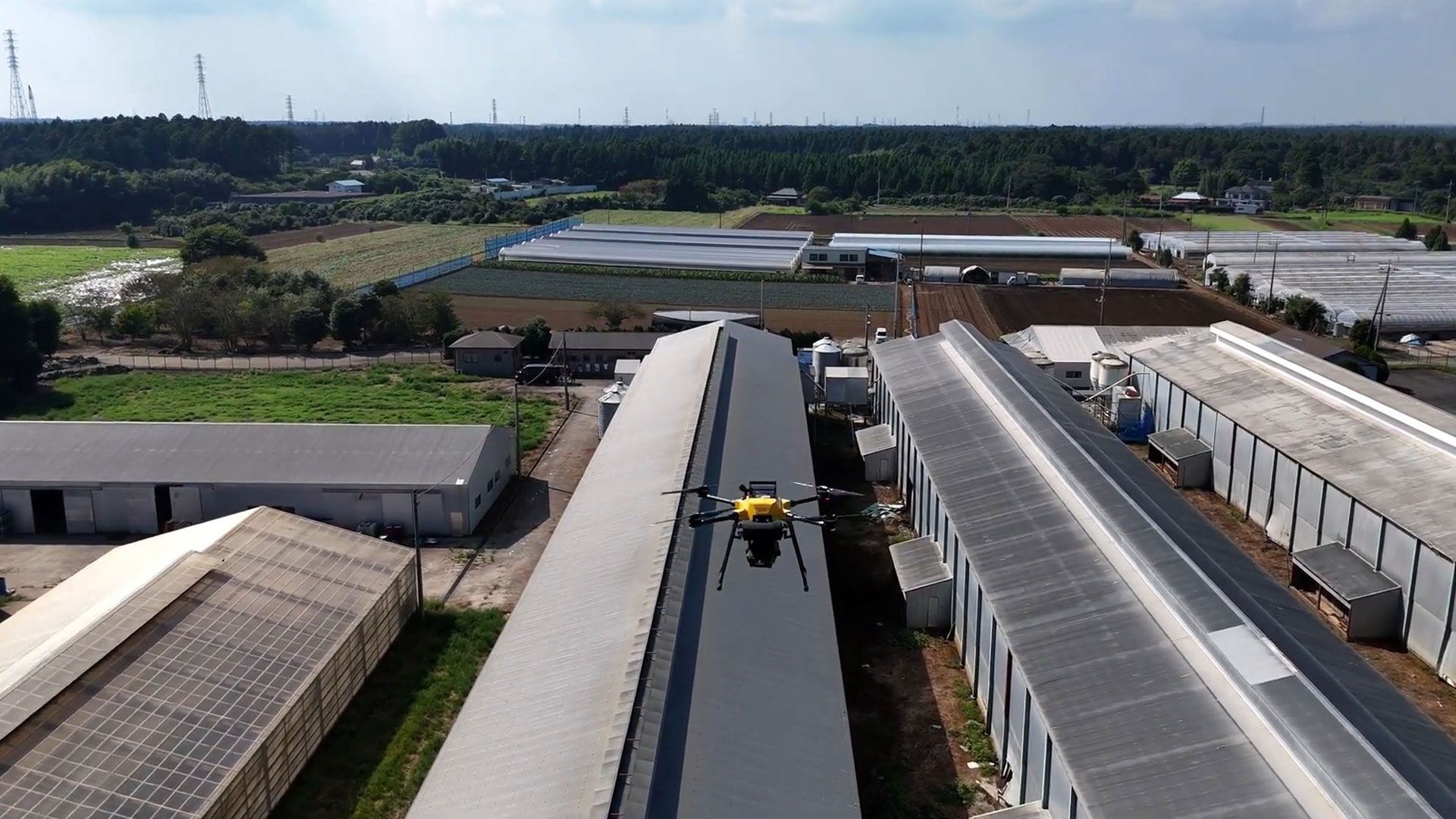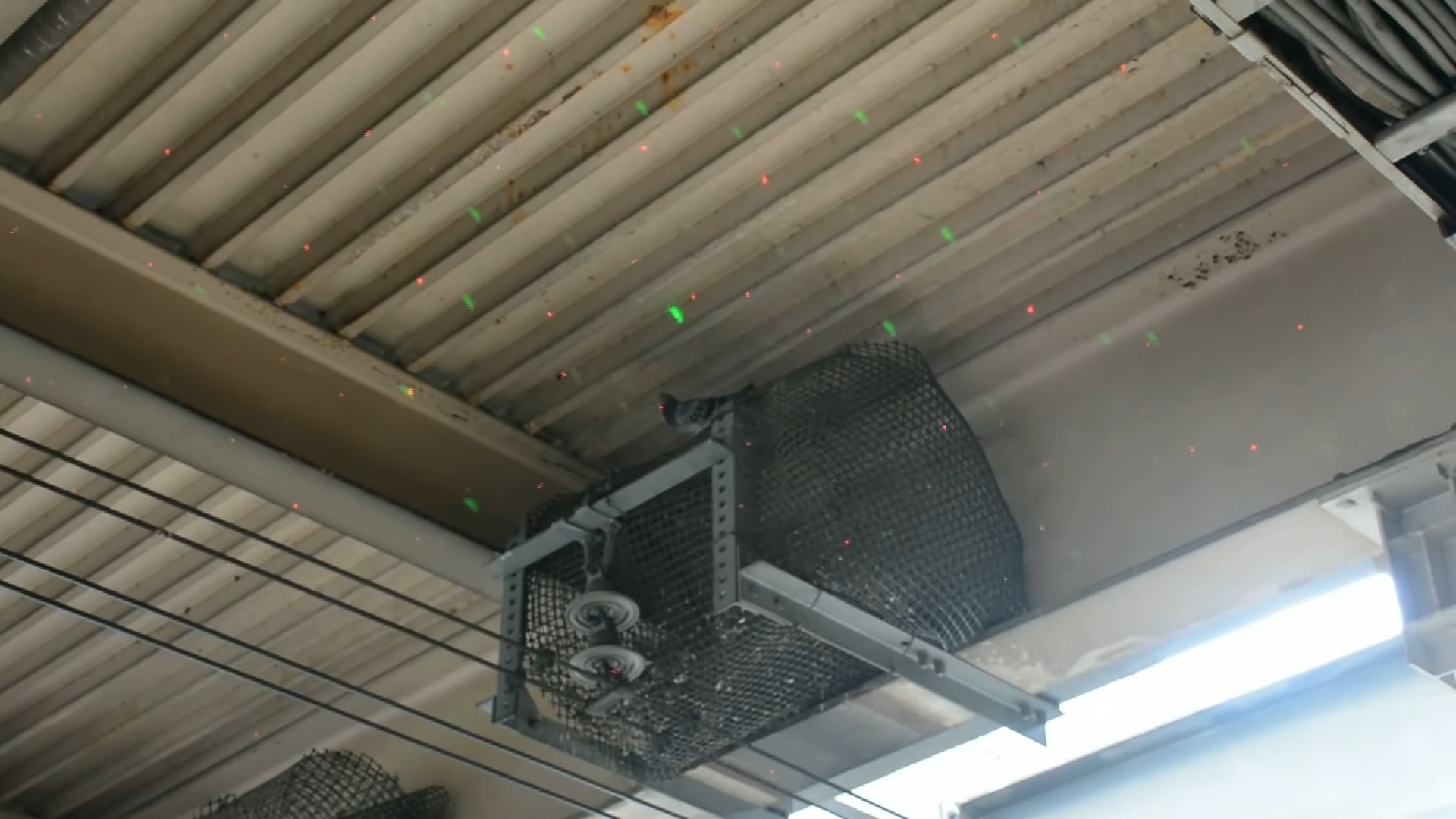Japanese tech giant deploys laser drones to protect chickens — drones are hoped to prevent the spread of avian flu
Feathered poultry farm visitors are scattered by laser beams.

Japanese telecommunications and tech giant NTT has designed a laser drone system to protect poultry farms. NTT e-Drone Technology Co., Ltd worked closely with NTT East Japan Co., Ltd, and the government of Chiba Prefecture to develop a laser system to scare wild birds away from the farms (machine translation). The idea is to reduce or eliminate the spread of avian influenza from unwanted feathered visitors like crows and pigeons.
Many countries have faced devastating losses of livestock due to avian flu, and prevention is key in this instance – as the solution to any infection discovered is usually a drastic cull. Some bird flu strains (e.g. H5N1) are also a danger to humans, especially farmers and the like, in close contact with their hens.
According to NTT’s press release on the new laser drone system, “Between January and February 2025, a severe situation unfolded within Chiba Prefecture, resulting in the culling of over 3.3 million poultry.” Facing such circumstances means that investments in keeping flu at bay are very worthwhile.
Birds can spread the flu virus via their physical presence – entering a hen house, for example – or via droppings. This means it is important to act quickly to scare them off. NTT’s drones with deterrent lasers seem like they are a good fit for this task.

In some infographics shared by NTT, we see the proposed drone system. In the above illustrations, from the left, you can see some pesky crows visiting the poultry farm. Next up, an auto-navigating drone is sent up to scare the birds off. Rather than a single concentrated laser, the proposed BB102 drone fires a beam that is split into many rays. These are both red and green rays, chosen for their proven ability to ward off “pigeons, crows, starlings, deer, etc.” Moreover, the laser is intermittent, flickering on and off to prevent birds and animals settling in gaps between its rays.


Local government subsidies will help farmers pay for systems like this one from NTT. It is noted that this automated anti-feral bird drone is preferable to manually chasing visiting birds or animals away or using noise or chemical substances.
Follow Tom's Hardware on Google News, or add us as a preferred source, to get our up-to-date news, analysis, and reviews in your feeds. Make sure to click the Follow button!
Get Tom's Hardware's best news and in-depth reviews, straight to your inbox.

Mark Tyson is a news editor at Tom's Hardware. He enjoys covering the full breadth of PC tech; from business and semiconductor design to products approaching the edge of reason.
-
Zaranthos Why are the "experts" and those who purport to "follow the science" too stupid to let natural immunity happen, oh I don't know, naturally? If it spreads among wild birds just how are we ever going to stop it? Don't kill the exposed flocks but let the ones that survive develop natural antibodies. We should also seriously think about getting away from mass confined herds and start promoting smaller more natural farms. Viral load is also a thing and mass confined flocks just increase that effect. I swear nobody has any common sense anymore. We should also question some of our genetic abomination practices where we breed flocks for traits that have nothing to do with health or nutrition but only profits. Killing our food supply every time the little critters get a stuffy nose is the reason why we pay outrageous prices for food.Reply -
bit_user Reply
If this were a solution to influenza, then why does it still exist at all? It's been around long enough that if animals and people could just build up an immunity to it, then we wouldn't even be talking about it.Zaranthos said:Why are the "experts" and those who purport to "follow the science" too stupid to let natural immunity happen, oh I don't know, naturally?
The reason probably has to do with the fact that influenza is a rapidly-mutating virus. It has two different mechanisms of mutation. The variations it can "innovate" are enough that people and animals need annual vaccinations for protection, as opposed to some viruses where a single vaccination provides lifetime immunity.
Okay, so after it wipes out a lot of your flock, now your birds have immunity to this year's strain. That might not help you, next year.Zaranthos said:Don't kill the exposed flocks but let the ones that survive develop natural antibodies.
Also, if we're talking about chicken raised for meat (i.e. not eggs), then I think the flock turnover happens multiple times per year.
That depends on how much you want to pay for your meat & eggs. Keeping the birds confined not only increases density and scale, but also reduces calorie burn and is a part of why chicken is a more cost-effective source of protein than beef.Zaranthos said:We should also seriously think about getting away from mass confined herds and start promoting smaller more natural farms.
The only cheaper source of animal protein is insects, which are cold-blooded and can be raised in very high densities. Too bad people in modern societies no longer like eating insects. They formed a substantial part of our ancestors' diet.
No, because it's the exception that a flock is infected with such a virulent strain. If it happened all the time, you're right that there would be more responses by the industry.Zaranthos said:Killing our food supply every time the little critters get a stuffy nose is the reason why we pay outrageous prices for food. -
bit_user BTW, I recently heard about farmers in the US employing a fixed, rooftop-based laser system for doing the same thing. I don't know how it compares with these drones, but it seems to me that it'd be a cheaper & simpler way to go.Reply -
gg83 Reply
I agree partially. The problem comes when who decides who lives and dies. We seem to want everyone to live. Thats good, but our future generations will have ZERO natural immunity. The black plague basically killed 2/3 of the world. The 1/3 that survived was naturally immune. We will need to let that happen or we will all live in our own bubbles and only interact via video.Zaranthos said:Why are the "experts" and those who purport to "follow the science" too stupid to let natural immunity happen, oh I don't know, naturally? If it spreads among wild birds just how are we ever going to stop it? Don't kill the exposed flocks but let the ones that survive develop natural antibodies. We should also seriously think about getting away from mass confined herds and start promoting smaller more natural farms. Viral load is also a thing and mass confined flocks just increase that effect. I swear nobody has any common sense anymore. We should also question some of our genetic abomination practices where we breed flocks for traits that have nothing to do with health or nutrition but only profits. Killing our food supply every time the little critters get a stuffy nose is the reason why we pay outrageous prices for food. -
Zaranthos Replybit_user said:If this were a solution to influenza, then why does it still exist at all? It's been around long enough that if animals and people could just build up an immunity to it, then we wouldn't even be talking about it.
The reason probably has to do with the fact that influenza is a rapidly-mutating virus. It has two different mechanisms of mutation. The variations it can "innovate" are enough that people and animals need annual vaccinations for protection, as opposed to some viruses where a single vaccination provides lifetime immunity.
Okay, so after it wipes out a lot of your flock, now your birds have immunity to this year's strain. That might not help you, next year.
Also, if we're talking about chicken raised for meat (i.e. not eggs), then I think the flock turnover happens multiple times per year.
That depends on how much you want to pay for your meat & eggs. Keeping the birds confined not only increases density and scale, but also reduces calorie burn and is a part of why chicken is a more cost-effective source of protein than beef.
The only cheaper source of animal protein is insects, which are cold-blooded and can be raised in very high densities. Too bad people in modern societies no longer like eating insects. They formed a substantial part of our ancestors' diet.
No, because it's the exception that a flock is infected with such a virulent strain. If it happened all the time, you're right that there would be more responses by the industry.
We've lived with these diseases from the dawn of time and they're not going away. The difference now is we weaponize them to make them worse then think we can somehow contain what has never been contained before. Our arrogance... -
gg83 Reply
I believe we need to increase our immune systems more. Empowering our immune system is part of cancer treatment. The flu is a difficult one for sure. Viruses are amazing and scary. I recently went down a rabbit hole about the bacteriophage. It looks bio-engineered. I like to imagine a past advanced society designing it and lead to the fall of that civilization.bit_user said:If this were a solution to influenza, then why does it still exist at all? It's been around long enough that if animals and people could just build up an immunity to it, then we wouldn't even be talking about it.
The reason probably has to do with the fact that influenza is a rapidly-mutating virus. It has two different mechanisms of mutation. The variations it can "innovate" are enough that people and animals need annual vaccinations for protection, as opposed to some viruses where a single vaccination provides lifetime immunity.
Okay, so after it wipes out a lot of your flock, now your birds have immunity to this year's strain. That might not help you, next year.
Also, if we're talking about chicken raised for meat (i.e. not eggs), then I think the flock turnover happens multiple times per year.
That depends on how much you want to pay for your meat & eggs. Keeping the birds confined not only increases density and scale, but also reduces calorie burn and is a part of why chicken is a more cost-effective source of protein than beef.
The only cheaper source of animal protein is insects, which are cold-blooded and can be raised in very high densities. Too bad people in modern societies no longer like eating insects. They formed a substantial part of our ancestors' diet.
No, because it's the exception that a flock is infected with such a virulent strain. If it happened all the time, you're right that there would be more responses by the industry. -
bit_user Reply
The differences now are that we have high-density agriculture, which was done to lower prices and feed more people.Zaranthos said:We've lived with these diseases from the dawn of time and they're not going away. The difference now
In general, another major difference between now and the ancient world is air travel. In ancient times, a disease could wipe out a town or a city, but not threaten people thousands of miles away. That is no longer true, and it means that we need new interventions, since it makes a big difference whether you're talking about 20% population loss in a small village vs the entire world.
Another big difference is that we continue encroaching into the natural habitat and that exposes livestock to new spillover events from animals. As most people are now aware, bats are a particularly rich reservoir of diseases.
If you want to go back to earlier forms of agriculture and disease management, then you also need to scale back the human population. Because a lot of these problems arose from having so many people on this planet and having to feed them. With the population still growing, you'd better get to work on that!Zaranthos said:Our arrogance... -
Notton Reply
Do you not remember how high egg prices in the USA shot up after bird flu hit in 2022?Zaranthos said:Why are the "experts" and those who purport to "follow the science" too stupid to let natural immunity happen, oh I don't know, naturally? If it spreads among wild birds just how are we ever going to stop it? Don't kill the exposed flocks but let the ones that survive develop natural antibodies. We should also seriously think about getting away from mass confined herds and start promoting smaller more natural farms. Viral load is also a thing and mass confined flocks just increase that effect. I swear nobody has any common sense anymore. We should also question some of our genetic abomination practices where we breed flocks for traits that have nothing to do with health or nutrition but only profits. Killing our food supply every time the little critters get a stuffy nose is the reason why we pay outrageous prices for food.
Food cost is a major issue in Japan right now, so it's just smart to mitigate damage as much as possible, instead of letting a contagious virus run unchecked.
In fact, crop farms and livestock farms do this anyways. You aren't allowed to visit a farm of any sort if you've visited a high risk area. -
bit_user Reply
Good luck with that. There are lots of nasty conditions that occur as a result of overactive immune systems.gg83 said:I believe we need to increase our immune systems more.
What you want is not simply an aggressive immune system, but to aim it at the pathogens it should fight off. That's what vaccines do.
Oh, but they don't just crank it up and send you on your way! They effectively create a custom vaccine that tells your immune system to attack the cancer cells.gg83 said:Empowering our immune system is part of cancer treatment.
It's not singular. Bacteriophages are any class of virus that attacks bacteria. With bacteria having been on this planet for 4 billion years, you'd better believe there are lots of viruses that infect them!gg83 said:I recently went down a rabbit hole about the bacteriophage. It looks bio-engineered.
From the wipipedia page:
"It is estimated there are more than 10^31 bacteriophages on the planet, more than every other organism on Earth, including bacteria, combined.4]"
It's fun to think about that sort of thing, but no artifacts exist which support the notion of advanced human civilizations capable of something like bioengineering. If they had, we'd definitely have found some traces of them.gg83 said:I like to imagine a past advanced society designing it and lead to the fall of that civilization.
Furthermore, I'm sure you could find bacteriophages in ice core samples from glaciers pre-dating the evolution of modern humans. -
Steve Nord_ TY for defending (v.) the natural immunity in freaking chicken sheds nut. Kinda shocked not to see either local 'Gus' or photovoltaics or green roofs atop the sheds.Reply
Long term drones though, it looks like they're making for. Just gotta watch for hawks with flipper64s.
